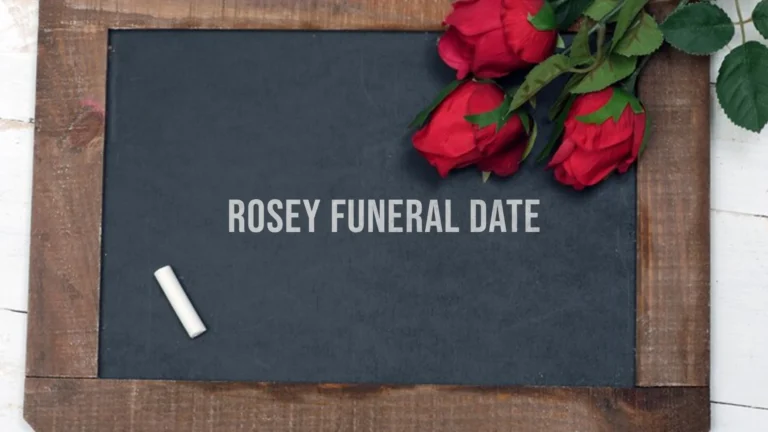The passing of a loved one is always a profound experience, and planning a Rosey funeral Date can be an overwhelming task. Among the many things to consider, the date of the funeral is particularly significant. This article aims to provide a comprehensive guide on planning a funeral, focusing on the important details and arrangements surrounding the funeral date.
TRENDING
Cumhuritey: Exploring The Essence Of The Republic
Understanding The Importance Of The Funeral Date
The funeral date holds substantial emotional and practical importance. It not only serves as a final farewell for friends and family but also marks the beginning of the grieving process. Choosing the right date for the funeral requires careful consideration of various factors, including family availability, religious customs, and logistical arrangements.
Emotional Significance
The date of the funeral is often etched in the memories of those who attend. It represents a moment of collective grief, remembrance, and closure. This makes it essential to select a date that allows for maximum participation from family and friends.
Practical Considerations
From a practical standpoint, the funeral date should allow time for necessary arrangements, such as securing a venue, coordinating with funeral service providers, and informing attendees. The timing may also be influenced by the deceased’s wishes, cultural customs, and legal considerations regarding the timing of burial or cremation.
Factors To Consider When Choosing The Funeral Date
Selecting the appropriate date for a funeral involves weighing various factors. Below are some key considerations to guide the decision-making process.
Availability of Family and Friends
One of the primary considerations is the availability of close family members and friends. It is essential to choose a date that accommodates the majority of those who wish to attend. Communicating with relatives and close friends can help identify the best possible date.
Religious and Cultural Practices
Many religions and cultures have specific guidelines regarding funerals. For instance, some traditions require that the burial takes place within a certain timeframe after death. Understanding these customs is crucial in determining an appropriate funeral date.
Funeral Home Scheduling
Funeral homes often have a busy schedule, particularly during peak seasons. Contacting the chosen funeral home as soon as possible can help secure a preferred date and time. They can also provide guidance on how to plan the service effectively.
Travel Considerations
If family members or friends are traveling from out of town, it is crucial to consider their travel schedules. Allowing extra time for travel can increase attendance and ensure that more people can pay their respects.
Availability of Venue
The choice of venue can also influence the funeral date. Many families opt for a church service, a funeral home, or even an outdoor space for the ceremony. Each of these venues may have specific availability, so it’s important to check these schedules as part of the planning process.
Making Funeral Arrangements
Once the funeral date is determined, several arrangements must be made to ensure the service runs smoothly. Below are some of the key components of funeral planning.
Selecting a Funeral Home
Choosing a reputable funeral home is one of the first steps in the process. Look for a home that meets your family’s needs and preferences. It’s advisable to meet with the funeral director to discuss your options and get a clear understanding of their services and pricing.
Planning the Ceremony
The ceremony itself can be customized in various ways to honor the deceased. Families may choose to include readings, music, or special tributes that reflect the personality and wishes of their loved one.
Preparing Obituaries and Notices
Writing an obituary is a thoughtful way to commemorate the deceased’s life and inform others of the funeral details. It can be published in local newspapers and shared online to ensure a wide reach.
Coordinating with Officiants
If you want a religious leader or a celebrant to conduct the service, it’s essential to coordinate with them ahead of time. They can help guide the service and provide additional support to the family during this difficult time.
Transportation Arrangements
Organizing transportation for the family, as well as for guests who may need it, is another important consideration. This can include arranging hearses, limousines, or even carpooling options.
Communicating The Funeral Date
Once the funeral date is set, effective communication is vital to ensure that everyone who wishes to attend is informed.
Informing Family and Friends
One of the first steps in communicating the funeral date is to notify immediate family and friends. This can be done through phone calls, text messages, or personal visits.
Utilizing Social Media and Online Platforms
In today’s digital age, social media can be a powerful tool for sharing information. Posting the funeral details on platforms like Facebook can help reach a broader audience and ensure that everyone is informed.
Sending Formal Invitations
Some families opt to send formal invitations, particularly for larger gatherings. This can include printed cards or digital invitations outlining the details of the funeral service.
Creating a Memorial Website
Another option for communication is to create a memorial website. These sites can serve as a central hub for sharing information about the funeral, as well as memories, photos, and condolences from friends and family.
Post-Funeral Considerations
After the funeral, there are still several important aspects to consider.
Thank-You Notes
It’s customary to send thank-you notes to those who attended the service or provided support. This gesture of appreciation can help convey gratitude and strengthen family bonds during this challenging time.
Grieving Support
The grieving process can be long and complex. Families may wish to seek professional counseling or join support groups to help navigate their emotions and find comfort in shared experiences.
Memorial Services
In some cases, families may choose to hold a memorial service after the funeral. This can be an opportunity for additional friends and family to gather, share memories, and support one another.
Conclusion
Planning a funeral is an emotional and often challenging process. The date of the funeral plays a crucial role in allowing family and friends to come together to mourn and celebrate the life of the deceased. By carefully considering the factors involved and making thoughtful arrangements, families can create a meaningful farewell that honors their loved one.
ALSO READ: Discover The Rich Histories Of Clan Donathen Clan Roberson
FAQs
What is a funeral date?
A funeral date is the scheduled day on which the funeral service takes place. It is important for organizing attendance and making necessary arrangements for the service.
How do I choose a funeral date?
Consider factors such as the availability of family and friends, religious customs, the funeral home’s schedule, and any travel arrangements needed for attendees.
What should be included in a funeral announcement?
A funeral announcement typically includes the date, time, and location of the service, along with details about the deceased and any specific requests regarding attendance or contributions.
Is it necessary to have a formal funeral?
While many families opt for a traditional funeral, it is not mandatory. Families can choose alternative forms of memorialization, such as a celebration of life or a simple gathering.
What support is available for grieving families?
Grieving families can access various forms of support, including counseling services, support groups, and resources provided by local organizations to help them cope with their loss.

